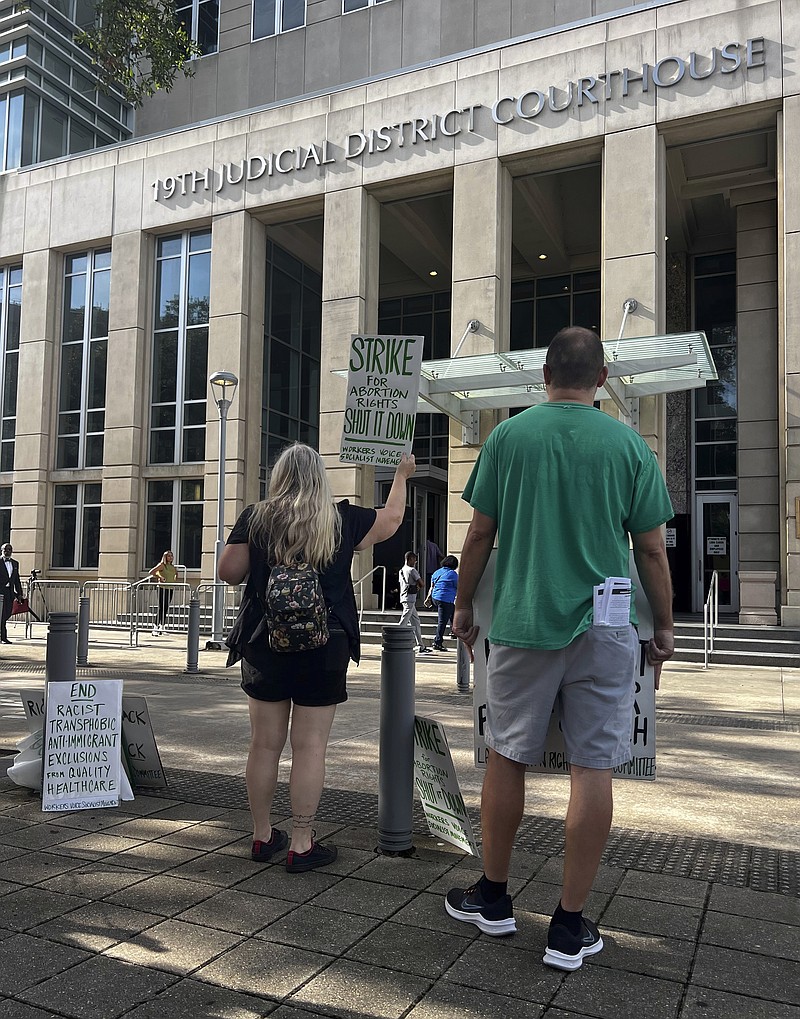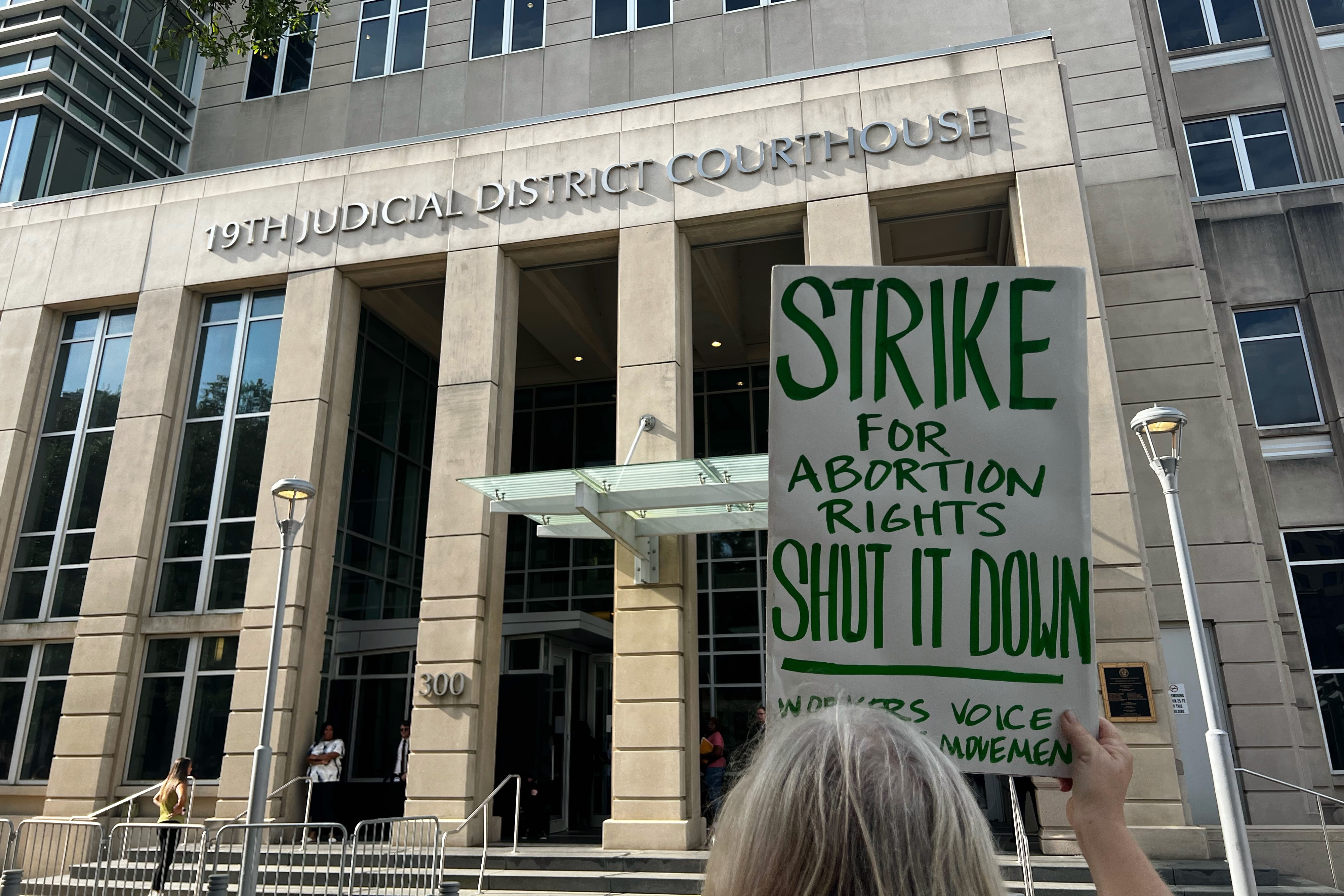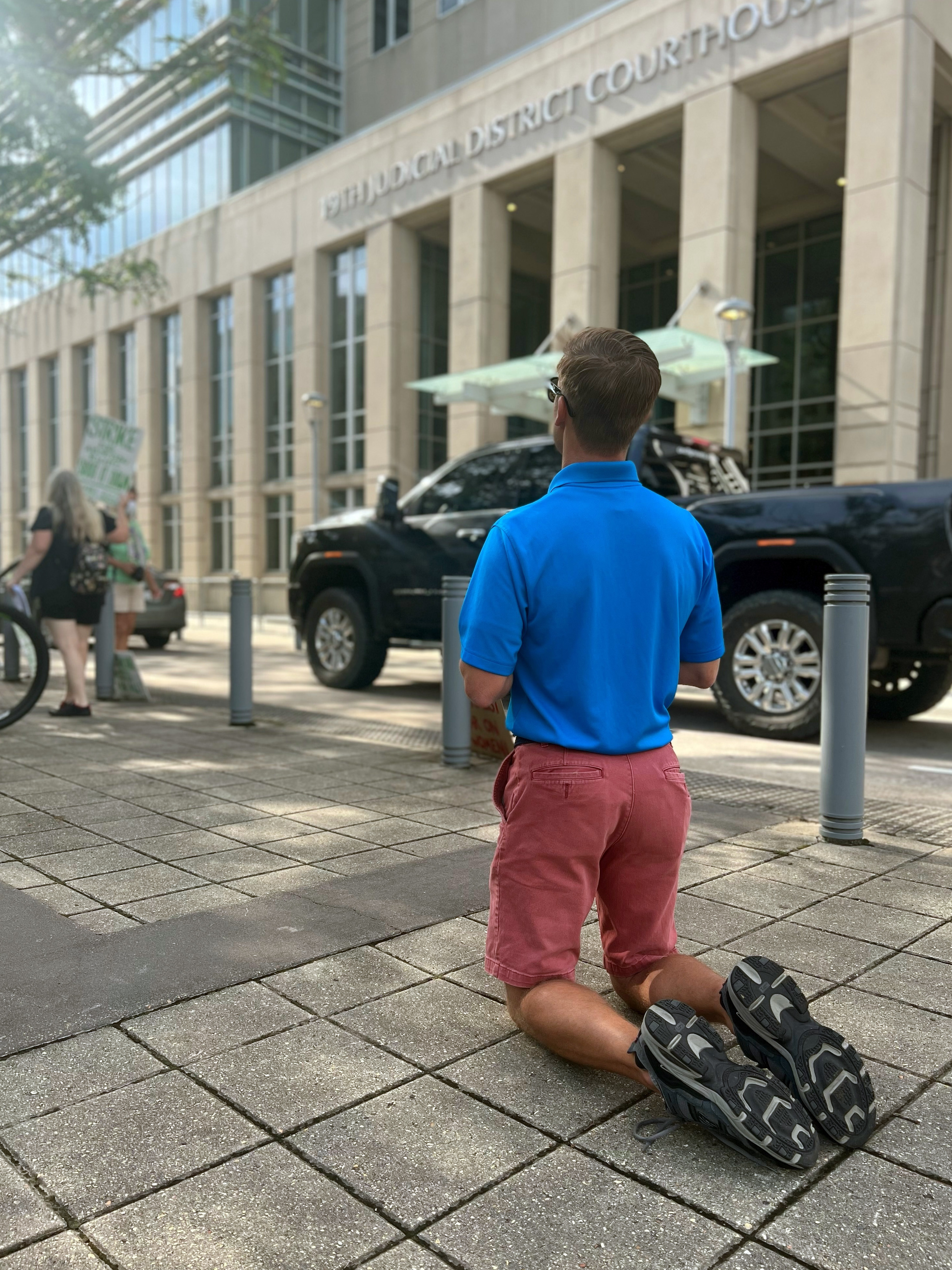BATON ROUGE -- Court battles prompted by the Supreme Court's June 24 ruling reversing abortion rights played out in multiple states Monday, with a judge in West Virginia blocking that state's 150-year-old abortion ban and one in Louisiana leaving an order against enforcement of that state's ban in place for now.
In another Monday development, the Supreme Court issued an order that put Indiana a step closer to being able to enforce a parental notification law involving girls who get abortions before they turn 18.
In West Virginia, Kanawha County Circuit Court Judge Tera L. Salango granted the Women's Health Center of West Virginia a preliminary injunction against the 1800s-era ban, saying that in the absence of action by the court, the clinic and its patients, "especially those who are impregnated as a result of a rape or incest, are suffering irreparable harm."
Attorney General Patrick Morrisey decried the ruling, calling it "a dark day for West Virginia." He said his office will appeal the decision to the state Supreme Court.
Women's Health Center lawyers argued that the 19th-century law is void because it has not been enforced in more than 50 years and has been superseded by a slew of modern laws regulating abortion that acknowledge a woman's right to the procedure. One example is West Virginia's 2015 law, which allows abortions until 20 weeks.
State attorneys argued that the law has not been active in decades only because prosecuting people for getting or performing abortions would have been illegal before the June 24 Supreme Court decision reversing Roe v. Wade. If lawmakers wanted to repeal the 1800s-era law, they would have done so, they argued.
In Louisiana, where an abortion clinic and others are challenging the state ban, District Judge Donald Johnson left a June 11 restraining order in place. He gave both sides until this morning to submit their "proposed findings of fact and conclusions of law" in the case and gave no indication when he would finally rule.
Johnson is pondering whether to allow enforcement of the abortion ban that was written in anticipation of the U.S. Supreme Court's June 24 decision.
Whatever Johnson decides, Louisiana Attorney General Jeff Landry said he anticipates that the case will ultimately end up before the Louisiana Supreme Court.
"We believe that ultimately we will prevail and the rule of law will be upheld," Landry said during a news conference, which was mostly drowned out by the chants of nearby protesters, after Monday's court hearing. "Those people who don't like it have two choices -- they can try to change the law, but if they find themselves in the minority of ideas, then they can pack their bags and go somewhere else."
In Indiana, a U.S. Supreme Court order put the state a step closer to being able to enforce a parental notification law involving girls who get abortions before they turn 18.
The law has been blocked for five years, but the Supreme Court ordered lower courts to take a new look at the law after the landmark June 24 decision. The order formally returned the Indiana case to lower courts that had refused to act while awaiting the judgment.
Abortion remains legal in Indiana up to about 20 weeks.
In Louisiana, there is little question that an abortion ban will eventually be in effect in the state where the Legislature has long been dominated by abortion opponents. The question as the lawsuit there progresses is when. The plaintiffs in the lawsuit are a north Louisiana abortion clinic and other supporters of legal abortion. They have managed to buy time for Louisiana's three abortion clinics, in Shreveport, Baton Rouge and New Orleans, while they argue that the current law is unconstitutionally vague.
The plaintiffs say the law has multiple, conflicting trigger mechanisms. They also argue that state law is unclear on whether it bans an abortion before a fertilized egg implants in the uterus.
In addition, although the law provides an exception for "medically futile" pregnancies in cases of fetuses with fatal abnormalities, the plaintiffs argue that the criteria for what constitutes such a pregnancy is unclear.
That leaves doctors "paralyzed" in trying to decide when an abortion would be legal, attorney Joanna Wright argued for the plaintiffs.
Landry's office argues that the state ban is constitutional and should no longer be blocked. Landry, in a filing last week, argued that the law "needs only to delineate what is illegal -- not define what is legal." John Balhoff, an attorney representing Landry, argued that the terms are clear and defined.
The lawsuit originated in New Orleans, where a judge issued a temporary order blocking enforcement of the ban June 27. Nearly two weeks later, a second New Orleans judge sent the case to Baton Rouge, saying state law required that it be heard in the capital. That move, in effect, ended the initial restraining order.
But Johnson issued a second temporary restraining order July 11.
"We're still getting a lot of desperate phone calls from women who are angry or sobbing," said Kathaleen Pittman, who runs an abortion clinic at Hope Medical Group in Shreveport, La. "They seem so totally beaten down because they've been trying to access care and, in one moment, it's available in a few weeks; the next minute, it may not ever be available here."
"When we were granted the most recent [temporary restraining order] -- I don't know how to describe the staff except for giddy," Pittman said. "The relief was palpable around here."
When the first restraining order expired, physicians at Pittman's clinic continued to meet with prospective patients and offer them counseling, ultrasounds and initial consultations. But patients could not access abortions while the courts considered the request to temporarily block the ban.
"Some of these women had been waiting weeks, or even months," Pittman said.
Hope Medical Group had a waiting list of 300 to 500 patients even before the Supreme Court's decision to roll back the federal protections guaranteed by Roe. Many patients scheduled to have an abortion shortly after the Supreme Court decision had their appointments canceled as the clinic halted the procedure for several days because of the state's trigger law. Some were able to reschedule after the court blocked the trigger ban -- but abortions stopped again when the first temporary restraining order expired.
Landry has sought to discourage patients from seeking abortions even while the state's ban is blocked by the courts. When some clinics resumed services after the second restraining order went into effect, Landry tweeted out a "reminder."
"Louisiana's laws banning abortion have not been enjoined," he wrote. "Subject to certain exceptions, abortion remains a criminal offense in our State! Anyone performing abortions, pending outcome, will be culpable when the case is closed in favor of the laws of our State."
But legal experts say criminal laws are not typically applied to actions that took place when those laws were blocked by the courts.
"Most people would tell you there is a real retroactivity problem there," said Elizabeth Sepper, a professor of law at the University of Texas at Austin. "You can't apply criminal law that didn't exist at the time to a provider who was operating under a TRO [temporary restraining order] or a preliminary injunction."
Landry also criticized the court for temporarily blocking enforcement of the state's abortion laws that have been supported "at the ballot box and through their elected legislature again and again and again."
"To have the judiciary create a legal circus is disappointing and what discredits the institutions we rely upon for a stable society," Landry tweeted shortly after a judge granted the second temporary restraining order. "The rule of law must be followed, and I will not rest until it is. Unfortunately, we will have to wait a little bit longer for that to happen."
The judge may decide later this week whether Louisiana's trigger law that bans abortion will continue to be blocked as the case wends its way through the courts. If the law is not blocked, the state's three abortion clinics will have to close their doors to patients, Pittman said.
"We absolutely have to have that preliminary injunction," Pittman said.
Information for this article was contributed by Kevin McGill and Mark Sherman of The Associated Press and Katie Shepard of The Washington Post.
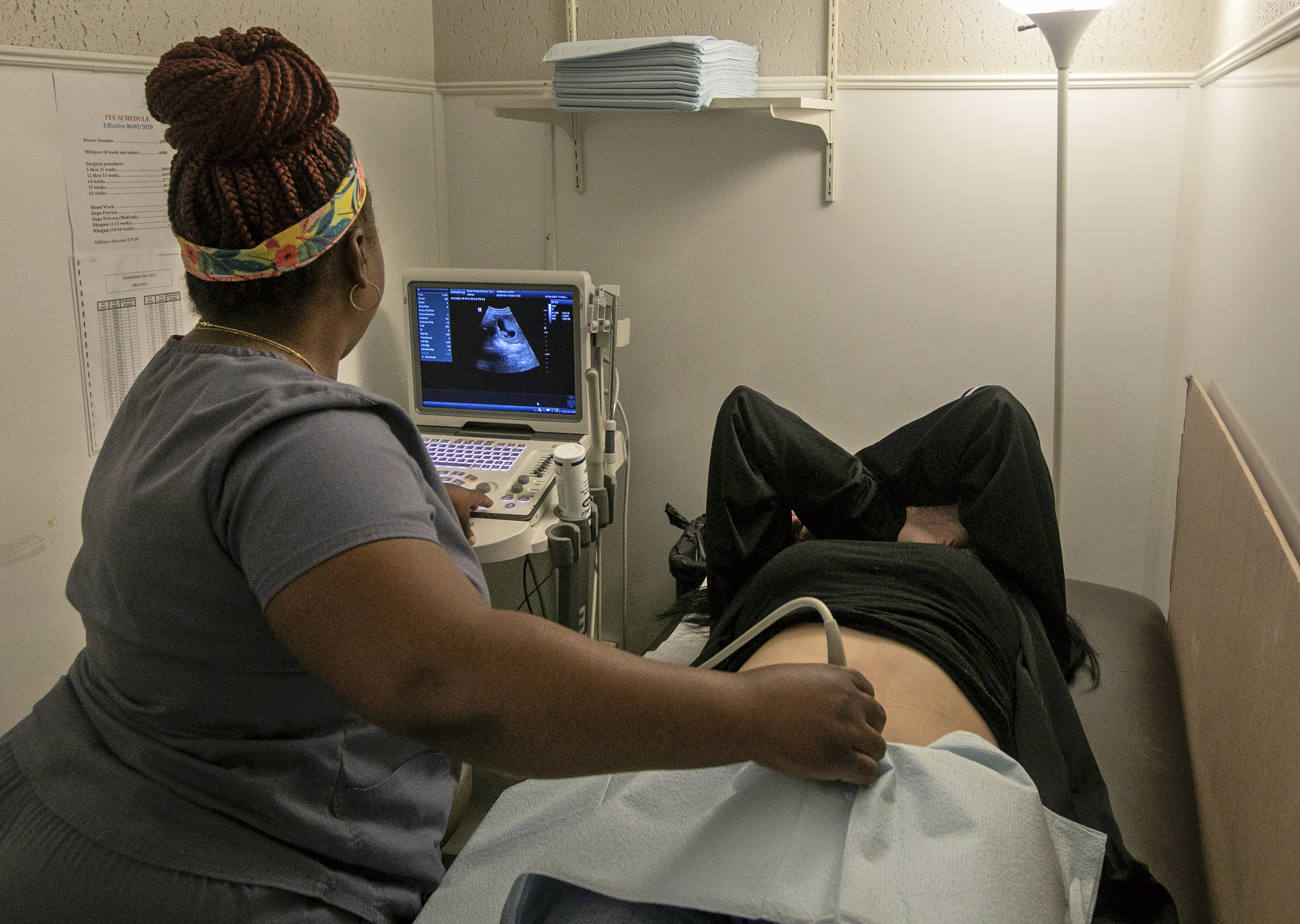 FILE - An operating room technician performs an ultrasound on a patient at Hope Medical Group for Women in Shreveport, La., on July 6, 2022. With access to abortion flickering in Louisiana, the legal battle over the statewide ban continues with a court hearing scheduled to begin Monday morning, July 18. (AP Photo/Ted Jackson, File)
FILE - An operating room technician performs an ultrasound on a patient at Hope Medical Group for Women in Shreveport, La., on July 6, 2022. With access to abortion flickering in Louisiana, the legal battle over the statewide ban continues with a court hearing scheduled to begin Monday morning, July 18. (AP Photo/Ted Jackson, File)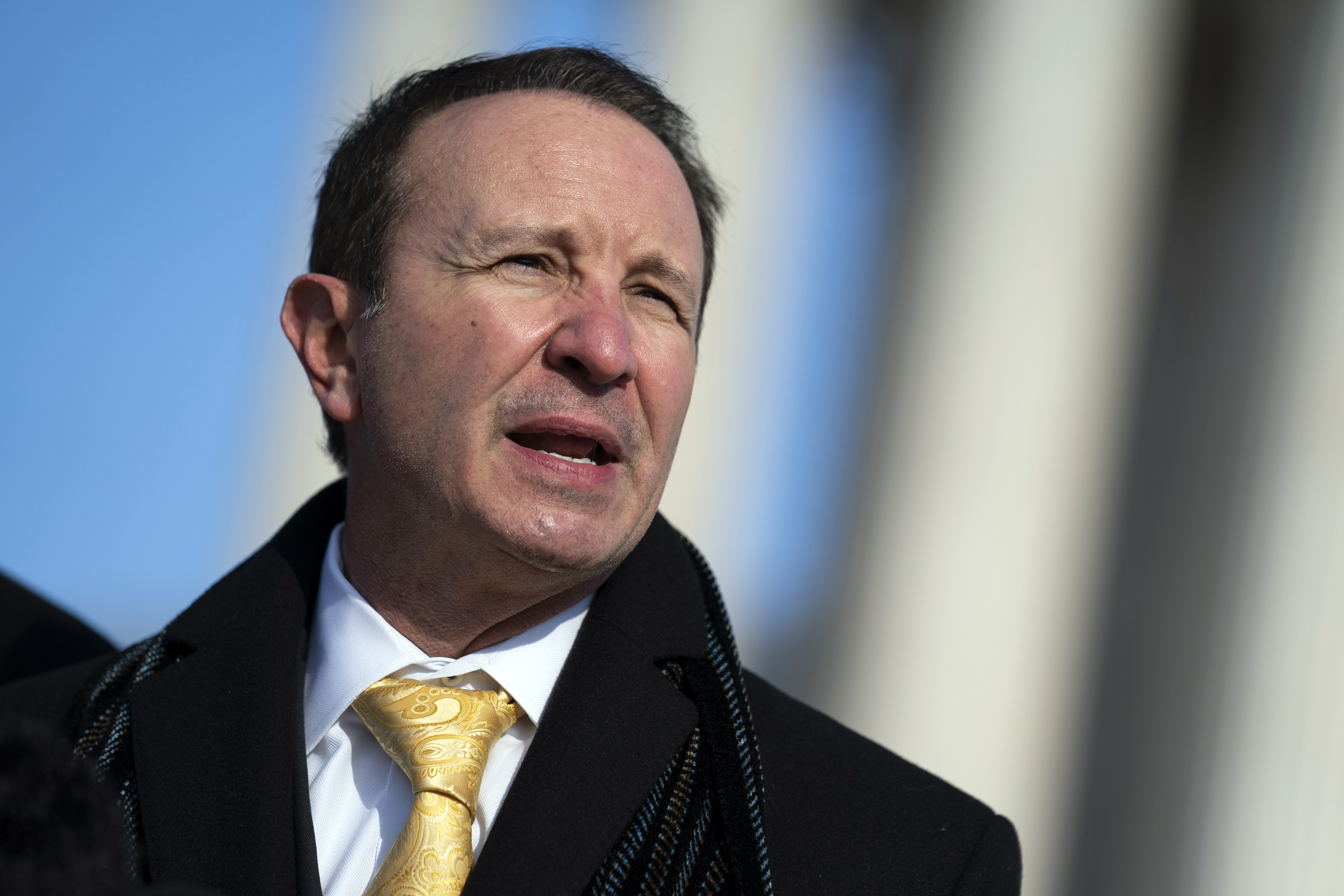 FILE - Louisiana Attorney General Jeff Landry talks to reporters outside the Supreme Court on Jan. 7, 2022, in Washington. With access to abortion flickering in Louisiana, the legal battle over the statewide ban continues with a court hearing scheduled to begin Monday morning, July 18. Landry's office will argue that the state ban is constitutional and should no longer be blocked. (AP Photo/Evan Vucci, File)
FILE - Louisiana Attorney General Jeff Landry talks to reporters outside the Supreme Court on Jan. 7, 2022, in Washington. With access to abortion flickering in Louisiana, the legal battle over the statewide ban continues with a court hearing scheduled to begin Monday morning, July 18. Landry's office will argue that the state ban is constitutional and should no longer be blocked. (AP Photo/Evan Vucci, File)